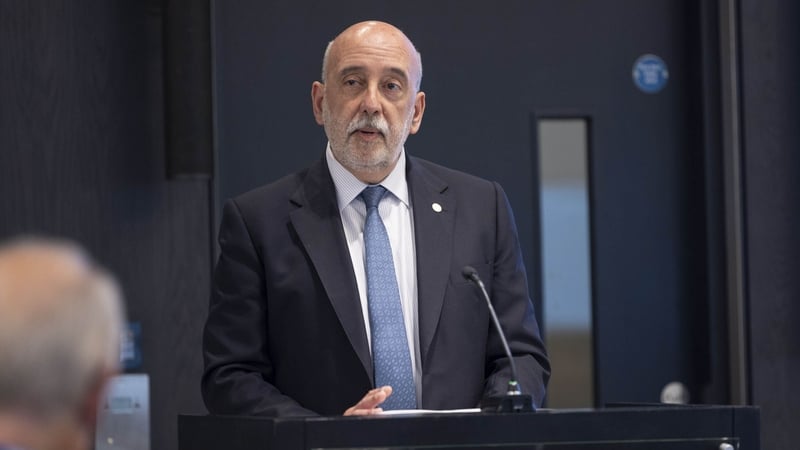The Governor of the Central Bank has said the Government should take stock of the interventions it has already made in housing before easing any lending rules for developers.
Responding to reports in the Irish Independent that the Government plans to allow developers to invest less and borrow more from banks to speed up homebuilding, Gabriel Makhlouf said “many interventions” have already been made in the housing market.
Mr Makhlouf said his “strong advice” would be to “take stock of all of those interventions, make sure they are mutually supportive of each other, before introducing new ones”.
He added that he thinks the banks are well capitalised and have the capacity to lend more.
“It’s their commercial judgement at the end of the day” if they want to lend more and that will depend on their risk appetite, he stated.
The Governor will be meeting Minister for Housing James Browne in the coming weeks for what he called a “long-scheduled meeting”.
Responding to the Governor’s comments, the Minister for Housing said the Government has to look at every measure possible to deliver more housing and said finance is a real issue in the private sector.
Mr Browne said the Government is delivering €6.5 billion in capital funding this year, but multiples of that are needed from the private sector to build more homes.
He said that financing in Dublin city centre was “broken”, adding that if it was working, more apartments would be being built.
We need your consent to load this rte-player contentWe use rte-player to manage extra content that can set cookies on your device and collect data about your activity. Please review their details and accept them to load the content.Manage Preferences
Looming trade dispute between US and EU “extremely concerning”
The Central Bank Governor also said that a looming trade dispute between the United States and the European Union is “extremely concerning”, as he warned that the country is in a period of “significant change and volatility”.
Mr Makhlouf said forecasting in a time of “extreme uncertainty” is challenging, adding that he was reluctant to “speculate” on the impact of US tariffs on the Irish economy.
He said that the views of the Central Bank are in line with those reflected in a report on the potential impact of tariffs from the Department of Finance and the Economic and Social Research Institute (ESRI).
It found that an intense trade dispute between the US and the EU would risk increased prices, fewer new jobs and slower growth in the economy.
Mr Makhlouf also said the European Central Bank must remain cautious about its next interest rate decision, despite inflation moving in the right direction.
“I mean, as far as inflation is concerned, a lot will depend on exactly what is done, and not just what is done by the people imposing tariffs, but what is done in response to those, and not just by the authorities and how they respond, but also how businesses decide to respond,” he said.
“They may decide to change their supply chains. How consumers respond. Consumers may choose that they’re not going to buy particular products because of the price, there’s a lot of uncertainty in that,” he said.
“I think the job that we have to do, certainly in merger policy, in terms of the ECB, is just being extremely vigilant as to what’s going on, try and understand what’s going on, try not to speculate about what might happen, and make decisions on the basis of speculation,” he stated.
“I mean in terms of the economic impact on Ireland itself, I’ve seen the comments that the Minister for Finance has made in the last few days and the ESRI and the Department of Finance report. Our views are not inconsistent with those. We published our quarterly bulletin last week and basically gave a similar message,” he said.
“It is extremely concerning. My overall sense is that we’re living in a period of significant change, significant volatility, and the most important thing that we can do is keep a clear head, understand exactly what is happening, and then make a decision on how to respond and start talking about what our view is as to its impact, ” he added.
“The last thing I’d want to do is to start speculating in a way that was just uncomfortable,” he cautioned.
Asked whether the ECB will hit its 2% inflation target next year in April, he said that while things are moving in the right direction, they are taking a slow approach and that they are not on a “predetermined rate path”.
“The projections have shown us reaching 2%, just slightly later than the previous ones,” he added.
“I wouldn’t put too much weight on that. The important thing is, 2% is what we’re aiming for.
“The reality, of course, is that we are living in a time of extreme uncertainty, so forecasting is a particular challenge,” he said.




